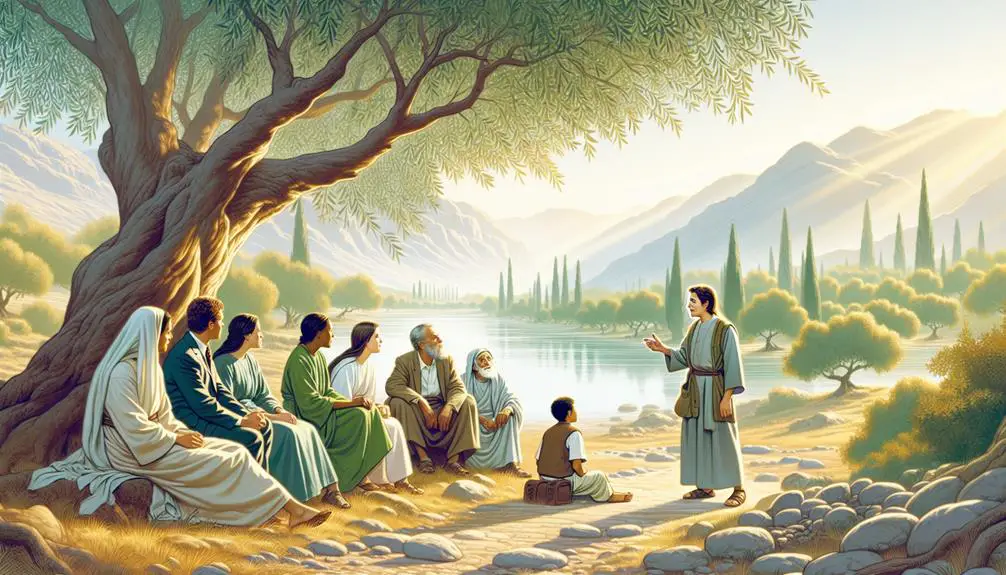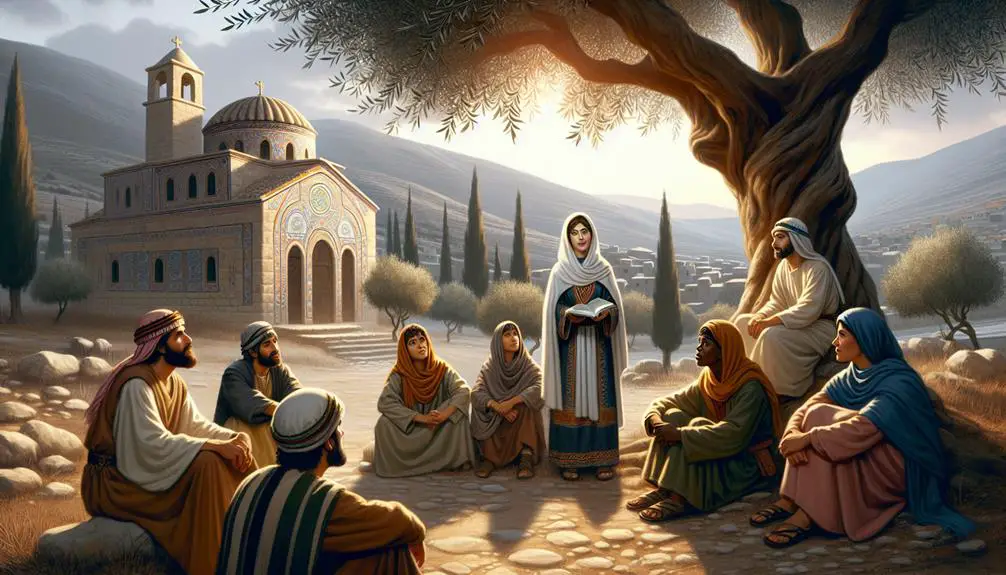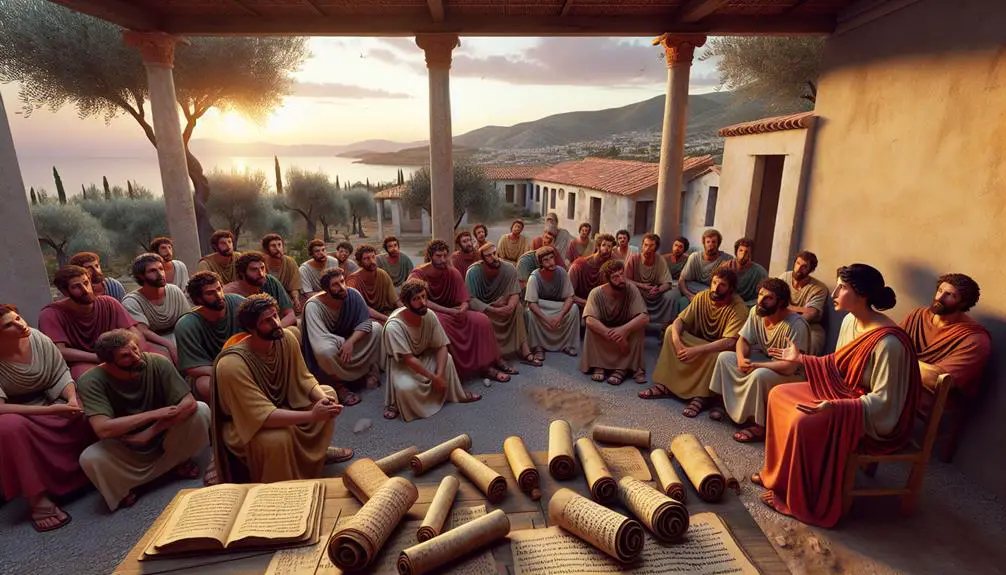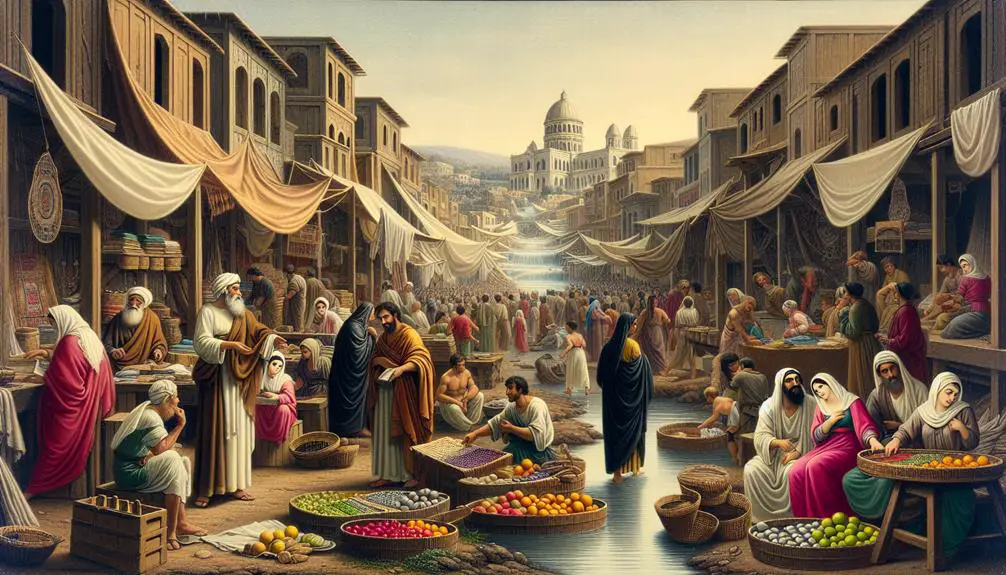Gain insight into the intriguing debate on who was the first woman missionary in the Bible, revealing their lasting legacy in spreading faith.

Who Was the First Woman Missionary in the Bible
In the tapestry of early Christian history, threads of remarkable women weave through, hinting at their pivotal roles as the first missionaries of the faith. You've likely heard names like Priscilla, Lydia, and Phoebe tossed around in discussions, each carrying her own unique story of faith and influence.
But who truly holds the title of the first woman missionary in the Bible? This question isn't just about staking a claim to a title; it's about understanding the profound impact these women had in spreading Christianity.
As you ponder their stories, consider how their legacies continue to shape modern perceptions of faith and leadership.
Key Takeaways
- Early Christian communities, including women like Junia and Tabitha, played pivotal roles in missionary work and spreading Christianity.
- Priscilla, alongside her husband Aquila, is highlighted for her leadership and contributions to early Christian missions, challenging traditional gender roles.
- Lydia and Phoebe's roles in supporting and nurturing the early Christian community underline the significant impact of women in early Christian missions.
- The legacy of these early female missionaries continues to inspire and challenge gender norms within religious vocations and communities.
The Concept of Missionary Work

What exactly constitutes missionary work, and how has its definition evolved over time? Initially, missionary work centered around the propagation of religious beliefs, primarily focusing on the spread of Christianity. The concept has its roots in the missionary origins of early Christian communities where spreading the gospel was seen as a divine mandate. Over centuries, the scope and methods of missionary activities have broadened, adapting to the changing cultural and social landscapes.
You'll find that the evolution of missionary work has been significantly influenced by the encounters with cultural barriers. These barriers, ranging from language differences to deeply ingrained societal norms, have challenged missionaries to develop more nuanced and respectful approaches to evangelism. The adaptation to these barriers has led to a more holistic understanding of missionary work, one that encompasses not only the sharing of religious beliefs but also the engagement in social justice issues, education, and healthcare as means of serving communities.
This broader perspective on missionary work reflects a shift from a focus on conversion to a focus on service and understanding. The encounter with cultural barriers has underscored the importance of dialogue and respect for different beliefs and practices. This evolution suggests that contemporary missionary work is as much about listening and learning from those it seeks to serve as it's about teaching and preaching.
Early Christian Women Evangelists

Early Christian women evangelists played a pivotal role in the spread of Christianity, breaking through societal barriers with their profound commitment and contributions. Their actions weren't just acts of faith but also bold statements in a world where women's roles were significantly limited. Analyzing their contributions provides valuable insights into the early Christian community and its inclusive nature.
To paint a picture for you, consider the following individuals and their contributions:
- Junia's Apostleship: Junia is noted in the New Testament as an apostle. Her recognition by Paul in Romans 16:7 not only highlights her notable role in the early Church but also challenges traditional gender roles. Her apostleship signifies a level of leadership and theological authority that was groundbreaking for the time.
- Tabitha's Charity: Known for her acts of charity and good works, Tabitha (or Dorcas) exemplifies the critical role of service in Christian evangelism. Acts 9:36-42 describes how her life and actions preached the Gospel, showing that evangelism isn't only about words but also about deeds that reflect Christ's love.
- Phoebe's Service as a Deacon: Phoebe is recognized for her service to the church in Cenchreae. Her role as a deacon and a benefactor to Paul and others underscores the essential support roles women played in the ministry and spread of Christianity.
- The Unnamed Women who Prayed and Prophesied: Acts and Paul's letters reference women who prayed and prophesied in the early church meetings, indicating that women actively participated in and contributed to the spiritual life of the Christian community.
These examples underscore the significant, though often understated, roles women played as evangelists in the early Christian movement. Their dedication and actions were instrumental in the spread of Christianity, demonstrating that their contributions weren't just peripheral but central to the mission of the church.
The Case for Priscilla

You'll find that Priscilla's role in the New Testament goes beyond mere mention; her presence signifies an early example of female leadership within the Christian community.
Analyzing her biblical depiction, especially in teaching contexts alongside her husband Aquila, offers insights into the dynamics of early Christian evangelism.
Their partnership not only emphasizes the collaborative nature of missionary work but also highlights Priscilla's significant contributions to spreading Christian teachings.
Priscilla's Biblical Presence
Priscilla's role in the New Testament highlights her pivotal contributions to the early Christian movement, reflecting a significant presence in biblical narratives. Her story, deeply intertwined with her husband Aquila, showcases a partnership that transcended societal norms of their time, emphasizing mutual mentorship and collaboration.
To paint a clear picture of her biblical presence:
- Engagement in Aquila's mentorship, showcasing a unique dynamic of mutual support and growth in faith.
- Mastery of tent-making skills, which served not only as a livelihood but also facilitated their ministry by providing a space for teaching and fellowship.
- Her presence in multiple cities, indicating an active role in spreading the Gospel.
- Recognition by Paul, who often mentioned her alongside Aquila, underscoring her importance in the early church.
Priscilla's narrative in the Bible underscores her significant role in shaping the early Christian community, illustrating the impact of her faith, skills, and partnership with Aquila.
Teaching Role Explored
Building on her established presence in the New Testament, Priscilla's role as a teacher demands a closer examination to appreciate her contributions to Christian doctrine and mentorship. Her ability to instruct and guide, particularly in a religious context, challenges traditional gender barriers that existed during her time. This not only highlights her prominence but also showcases the cultural implications of her teaching role.
Priscilla's involvement in theological discussions and her direct influence on early Christian leaders underline a transformative period where women's roles in religious settings were being redefined. Her actions serve as an early example of breaking through societal expectations and contributing significantly to the spread and understanding of Christian teachings, regardless of gender constraints.
Partnership With Aquila
Delving into the partnership with Aquila, it's evident that Priscilla's collaborative efforts significantly bolstered the early Christian movement, illustrating a dynamic duo's impact on religious teaching and community building. In examining their partnership, consider the following:
- Aquila's background: Originally from Pontus, he moved to Rome and subsequently to Corinth due to Emperor Claudius's edict expelling Jews.
- Roman context: Their ministry unfolded against a backdrop of political upheaval and religious skepticism, making their work particularly challenging.
- Shared mission: Together, they taught and spread Christian doctrines, emphasizing inclusion and community.
- Mentorship role: They notably mentored Apollos, enriching his understanding of Christianity, which underscores their influence on early Christian leaders.
Their synergy not only advanced the Gospel but also modeled a partnership that transcended cultural and gender barriers within the early Church.
Lydia's Conversion and Influence

Lydia's conversion to Christianity, as recounted in the Acts of the Apostles, signifies a pivotal moment in the early Christian community, demonstrating the profound impact of faith on individual lives and societal norms. Her story, deeply embedded in the narrative of the spread of Christianity, highlights not just a personal transformation but also the broader implications of such conversions in the ancient world. Lydia, a seller of purple goods, represents the intersection of commerce, gender, and religion, offering a unique lens through which to view the early Christian mission.
Her engagement in the purple trade, a luxury commodity highly valued in the Roman Empire, positioned Lydia as an individual of considerable social and economic standing. This aspect of her identity plays a crucial role in understanding the significance of her conversion. Lydia's baptism, followed by her immediate offer of hospitality to Paul and his companions, illustrates the transformative power of faith, transcending traditional social barriers and fostering a nascent Christian community.
Lydia's hospitality is emblematic of her pivotal role in the early church. By opening her home for worship and fellowship, she not only supported Paul's missionary activities but also facilitated the growth of the Christian community in Philippi. This act of generosity and leadership underscores the critical role women played in the spread of Christianity, often through the use of their homes as spaces for worship and community building.
Analyzing Lydia's story, one appreciates the multifaceted impact of her conversion. It wasn't merely a personal spiritual awakening but a catalyst for change, influencing both the social dynamics of the time and the propagation of the Christian faith. Through the lens of Lydia's experience, one gains insight into the early Christian community's reliance on the contributions of women, both in terms of their economic influence and their spiritual leadership.
Phoebe: A Proponent of the Gospel

You must now turn your attention to Phoebe, whose role as a deaconess in the early Christian church can't be underestimated.
Her contributions, as outlined in Paul's epistle to the Romans, serve as a testament to her significant influence on the spread of the gospel.
Analyzing her involvement provides insight into the early church's reliance on female leaders to foster its growth.
Phoebe's Role Defined
Phoebe stands out as a key figure in the early Christian community, embodying the role of a proponent of the Gospel through her service and leadership. Delving into her significance reveals:
- Phoebe's origins: Rooted in Cenchreae, she exemplifies early Christian female leadership, challenging prevailing societal norms.
- Deaconess debates: Her title sparks scholarly discourse on the roles women held, highlighting the evolving understanding of ecclesiastical positions.
- Service and support: Phoebe's contributions underscore her pivotal role in nurturing the nascent Christian community.
- Leadership: Her portrayal by Paul affirms the critical roles women played in the dissemination and establishment of Christian teachings.
This analysis underscores Phoebe's instrumental role in shaping the early Christian church, marking her as a significant proponent of the Gospel.
Contributions to Early Christianity
Several factors underscore the pivotal contributions of Phoebe to the development of early Christianity, particularly as a proponent of the Gospel. Her role transcends mere historical footnotes, embodying female apostleship in a time when gender boundaries were rigidly enforced.
Phoebe's association with the early church, as noted in the Pauline Epistles, highlights her as a critical facilitator and leader within the nascent Christian community. Her actions didn't just support the spread of Christian teachings; they also challenged and gradually shifted the perceptions of female involvement in religious leadership roles.
Through Phoebe's example, early Christianity witnessed the emergence of a more inclusive approach, acknowledging the significant contributions women could make as leaders and propagators of the faith.
Legacy and Modern Reflections

Reflecting on the legacy of the first woman missionary in the Bible sheds light on the evolving role of women in religious missionary work. This narrative not only highlights the strides made over centuries but also underscores the persistent challenges in gender dynamics and cultural impact.
- Gender Dynamics: Initially, women's roles in missionary work were often understated, constrained by the societal norms of their times. However, the story of the first woman missionary challenges these norms, demonstrating women's capability and resilience in spreading religious teachings. This has progressively influenced the perception of women's roles in religious contexts, encouraging a more inclusive understanding and practice.
- Cultural Impact: The inclusion and recognition of a woman's role in such a pivotal aspect of early Christianity have had a profound cultural impact. It has contributed to the gradual dismantling of gender barriers within religious vocations, inspiring women across generations to pursue roles that were once deemed inaccessible.
- Modern Reflections: Today, women occupy various leadership positions within religious communities, from pastoral roles to missionary work, reflecting a significant shift from traditional gender roles. This transition underscores the evolving understanding of gender equality within religious contexts.
- Legacy: The legacy of the first woman missionary continues to inspire and challenge contemporary religious communities to reevaluate and expand the roles women play. It serves as a testament to the transformative power of inclusion and the ongoing journey towards gender equality in religious missions.
Through this lens, one can appreciate the intricate interplay between historical narratives and their ongoing influence on gender dynamics and cultural norms within religious missionary work.
Frequently Asked Questions
How Did the Cultural and Societal Norms of the Time Affect the Ability of Women to Participate in Missionary Work?
Cultural barriers and societal expectations significantly limited women's participation in missionary work. You'd find that gender roles were strictly defined, relegating women to the domestic sphere, which hindered their public and religious roles.
Despite these constraints, some women transcended these limitations, subtly spreading their faith and teachings. Their stories, though lesser-known, highlight the resilience and ingenuity they employed to navigate and challenge the norms of their time.
What Specific Challenges Did the First Woman Missionary in the Bible Face Due to Her Gender?
You're exploring the specific challenges faced by the first woman missionary due to her gender. Gender bias limited her acceptance and effectiveness in spreading her message.
Societal norms often silenced women, making it difficult for her voice to be heard. Additionally, travel hardships posed significant risks, as traveling alone was both dangerous and frowned upon for women.
These obstacles required immense courage and resilience to overcome, showcasing her pioneering spirit in missionary work.
Are There Any Recorded Instances of Opposition or Support From Male Leaders Within the Early Church Towards Women Missionaries?
You're exploring how gender dynamics and leadership styles influenced the early church's reception of women missionaries. Indeed, the New Testament reflects mixed instances.
While some male leaders, like Paul, notably supported women in ministry roles (e.g., Phoebe in Romans 16), others likely harbored reservations, reflecting societal norms of the time.
This underscores the complex interplay between cultural expectations and the evolving roles of women in early Christian missionary activities.
How Did the Role of the First Woman Missionary in the Bible Evolve Over Time Within the Early Christian Communities?
You're exploring how the role of early Christian women missionaries evolved, focusing on their traveling methods and communication strategies.
Initially, their roles expanded as they traveled extensively, often on foot or by donkey, to preach and teach.
Their communication strategies evolved too, from personal testimonies to more structured teachings and letters, adapting to different audiences and challenges.
This evolution demonstrates their increasing influence and the early church's reliance on their contributions to spread Christianity.
Aside From the Women Mentioned, Were There Other Less Known Female Figures in the Bible Who Played a Significant Role in Spreading Christianity?
Yes, aside from the well-known figures, there were other female prophets and apostolic women in the Bible who significantly contributed to spreading Christianity. These lesser-known women played crucial roles within early Christian communities, often working behind the scenes or in partnership with more prominent leaders.
Their stories, though not always at the forefront, underscore the diverse contributions women have made to the faith's early development and expansion.
Conclusion
So, who truly was the first woman missionary in the Bible? The evidence points to several pioneering women, each with a compelling claim. Priscilla, Lydia, and Phoebe stand out as frontrunners, their lives weaving a rich tapestry of early Christian evangelism.
Yet, the definitive answer remains tantalizingly out of reach, shrouded in historical ambiguity. Their collective legacy, however, undeniably shapes a foundation for modern missionary work, epitomizing dedication, courage, and the transformative power of faith.



Sign up